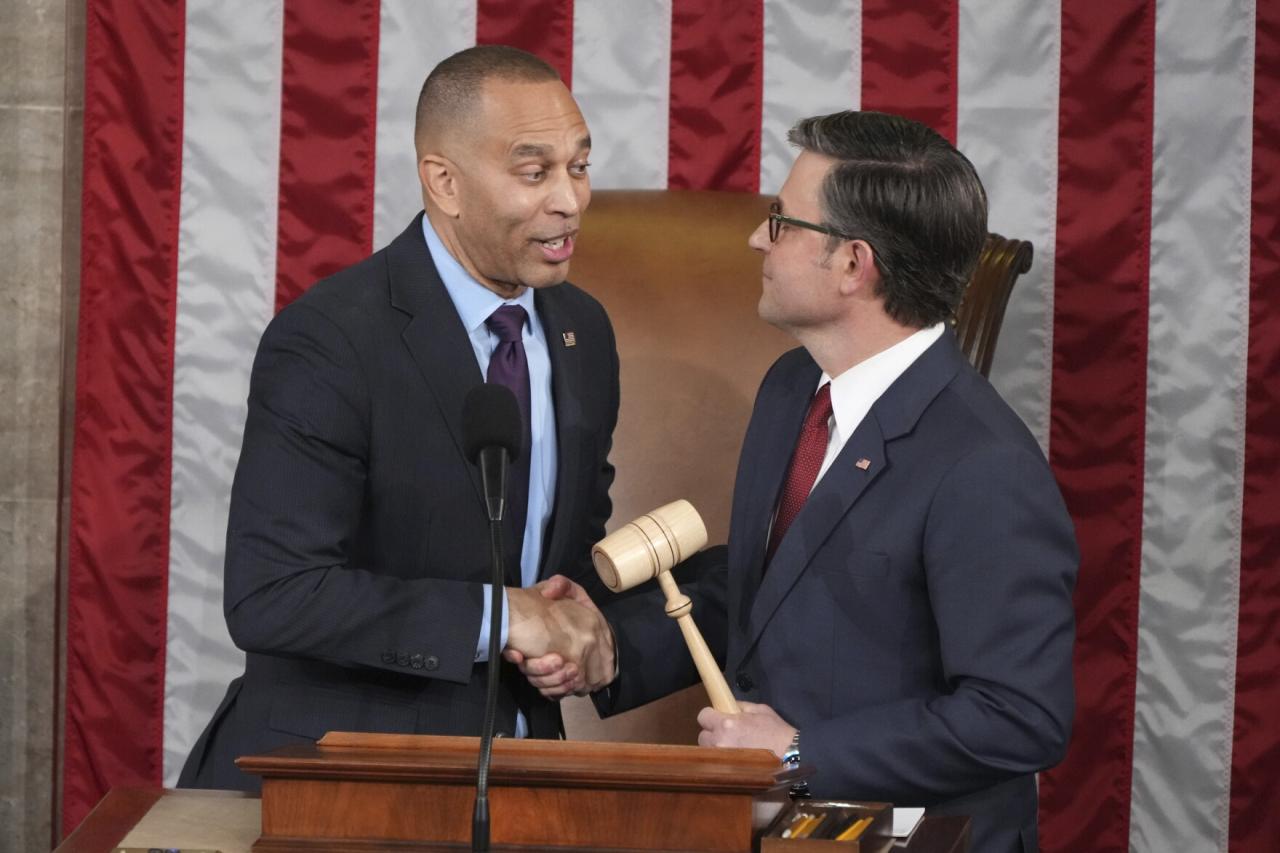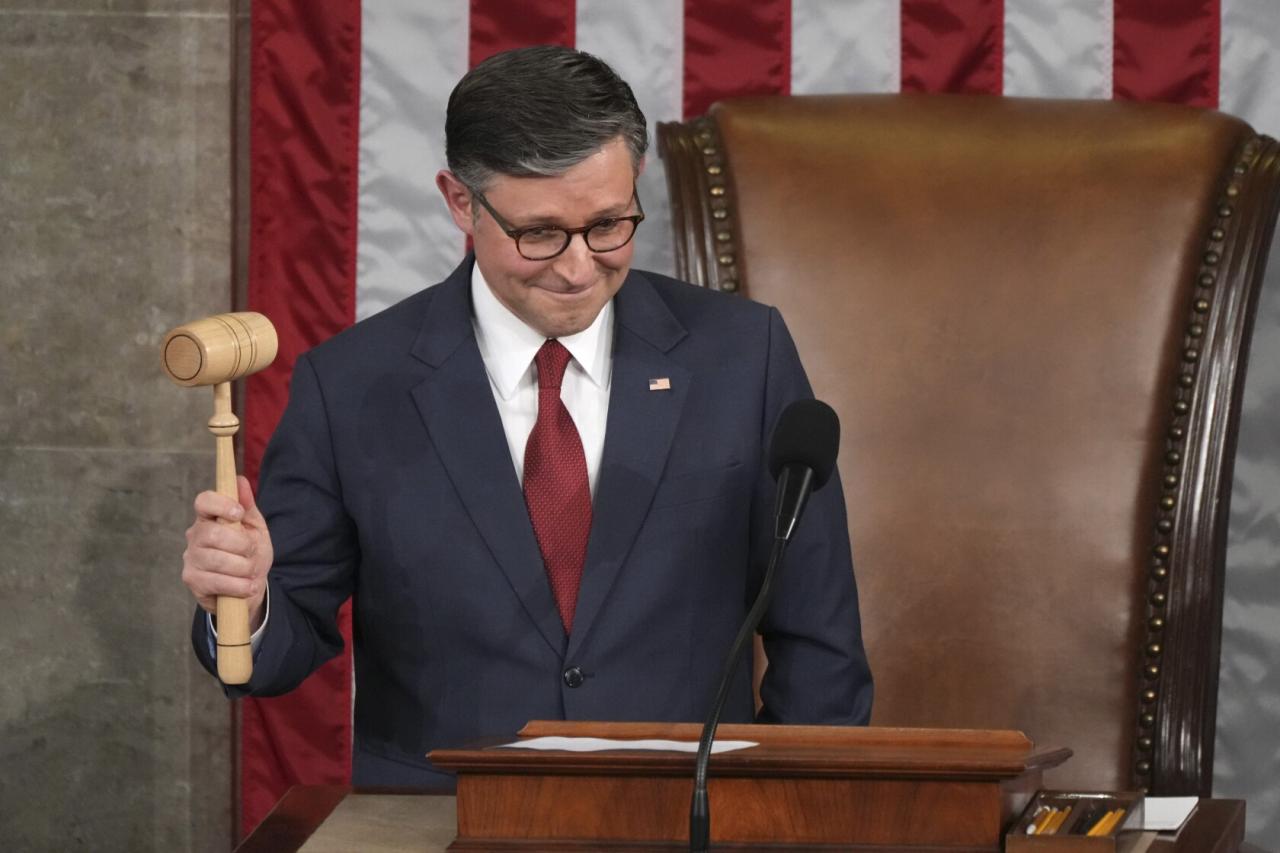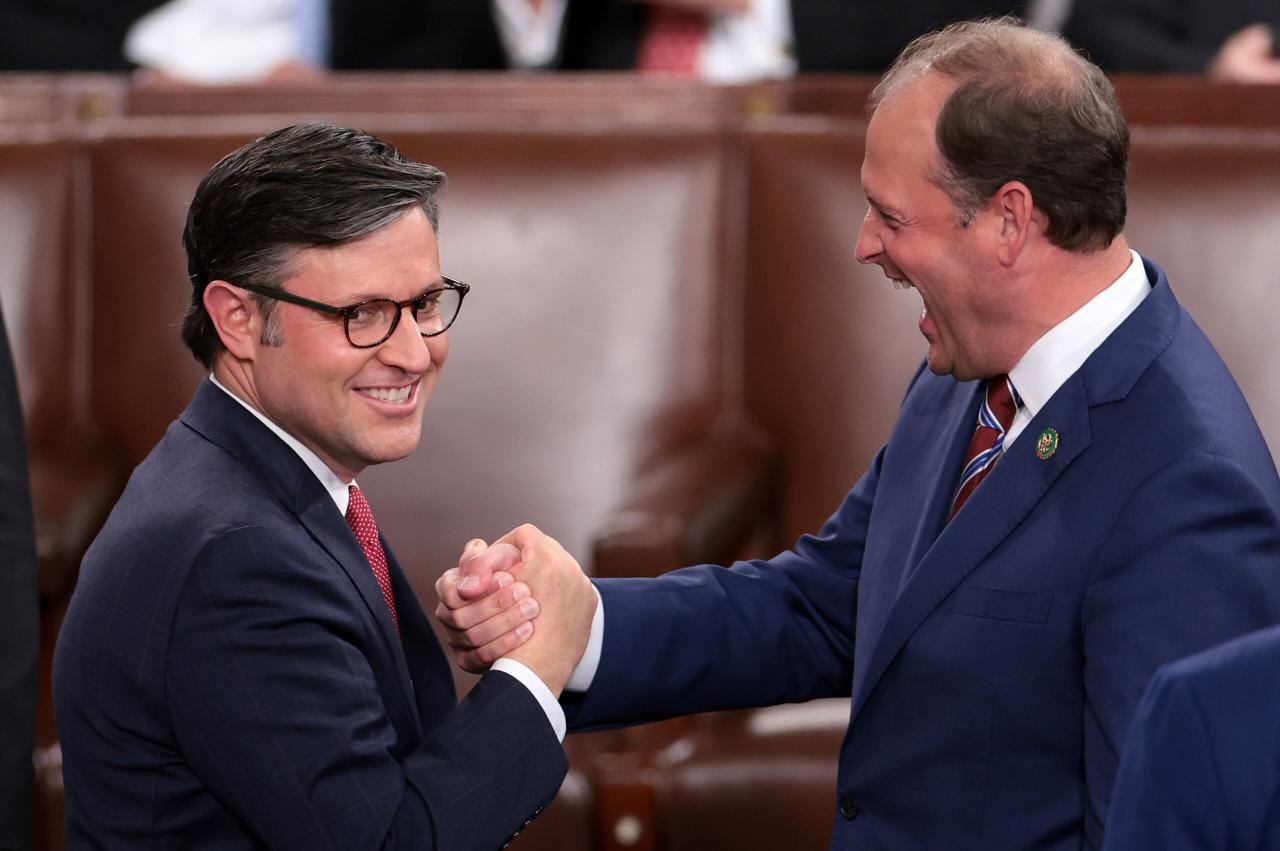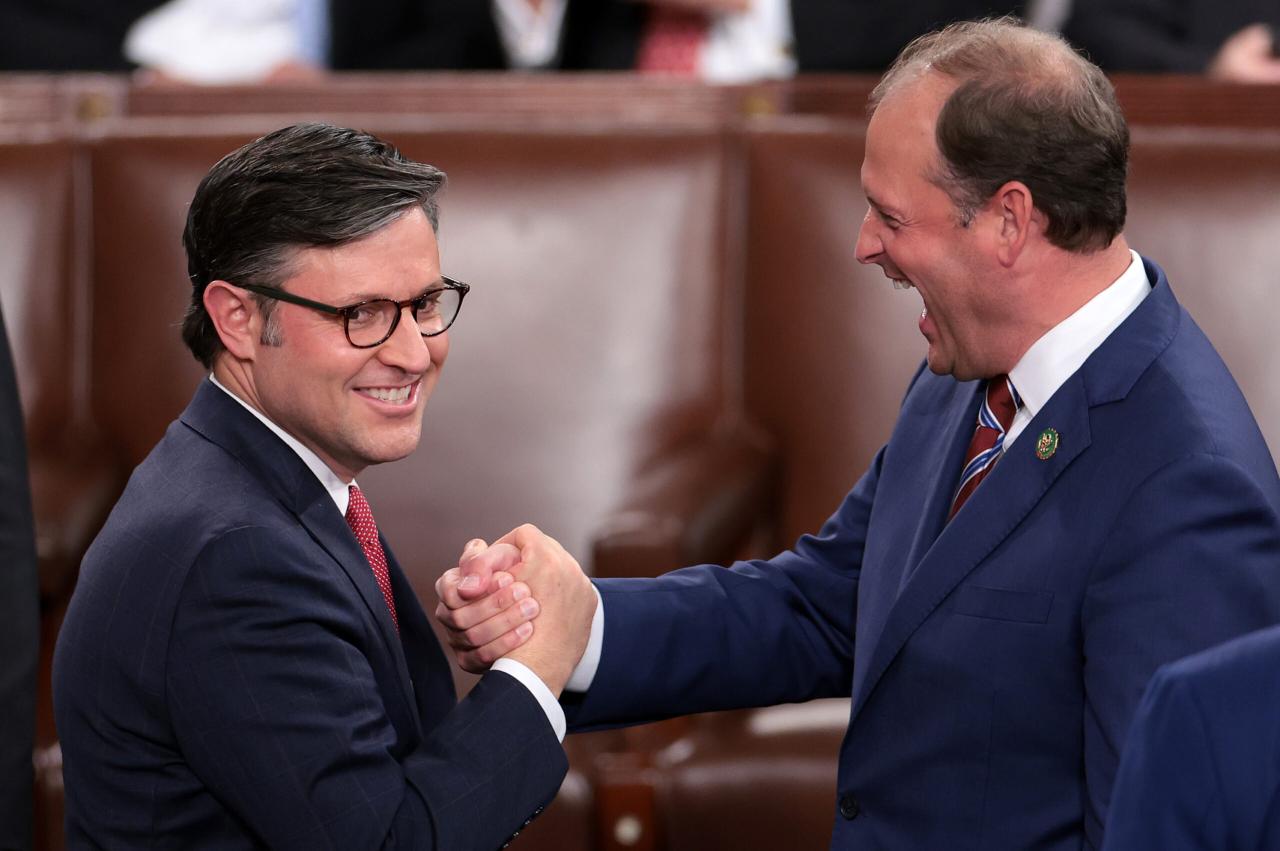Republican Mike Johnson reelected House speaker after dramatic internal party struggles highlights the deep divisions within the Republican party. This unexpected reelection, following multiple ballots and intense negotiations, reveals much about the current political landscape and the challenges facing the House of Representatives. We’ll delve into the voting process, the political maneuvering, and the potential implications for future legislation under Johnson’s leadership.
The article will examine the key players, their motivations, and the shifting alliances that ultimately secured Johnson’s victory. We’ll also explore the reactions from various political factions and analyze the potential consequences of this dramatic election, comparing it to past Speaker elections within the Republican party. Johnson’s policy priorities and their potential impact on future legislative initiatives will be a key focus, along with a closer look at the specific events that contributed to the dramatic nature of the election.
The Republican Speaker Election: Mike Johnson’s Reelection

The election of Mike Johnson as House Speaker was a dramatic affair, showcasing deep divisions within the Republican party. This article details the voting process, the significance of the outcome, reactions from various factions, Johnson’s agenda, and the factors contributing to the dramatic unfolding of events.
The Election Process
The voting procedure involved multiple ballots, with representatives casting votes for their preferred candidate. The number of rounds reflected the difficulty in securing a majority. Several key figures played significant roles in shifting alliances and influencing the final outcome. The sequence of events is detailed below.
| Speaker Candidate | Action | Outcome | Significance |
|---|---|---|---|
| Mike Johnson | Initially lacked majority support | Multiple rounds of voting | Highlighted internal divisions within the Republican party |
| [Opponent 1 Name] | Gained initial support from a faction | Failed to secure majority | Showcased the strength of opposition within the Republican caucus |
| Mike Johnson | Negotiated with wavering representatives | Secured majority in [Number]th round | Demonstrated Johnson’s ability to build consensus |
The Significance of the Reelection
Mike Johnson’s victory holds significant political implications, impacting future House legislation and the Republican party’s internal dynamics. His election is comparable to previous Speaker elections, offering valuable insights into the party’s evolution.
So, Republican Mike Johnson’s reelection as House Speaker was pretty dramatic, right? It makes you think about other unexpected shifts in leadership. For example, check out how Burnley’s manager, Vincent Kompany, is handling their striker situation after Ashley Barnes left – Thorup outlines City striker plans after Ashley Barnes exit – it’s a whole different kind of game, but equally fascinating to see how they’re adapting to the change.
The parallels between these two situations, while seemingly unrelated, are interesting to consider in terms of leadership transitions and strategic planning. Back to Mike Johnson though, his win certainly shows resilience in the face of opposition.
- Potential impact on legislation: Johnson’s leadership is likely to shape the legislative agenda, potentially prioritizing certain policy areas over others. This could lead to the passage of specific bills while delaying or blocking others.
- Implications for Republican party dynamics: The election reflects the internal power struggles within the Republican party, highlighting the diversity of opinions and priorities among its members.
Comparison to Past Speaker Elections:
- [Previous Speaker Election 1]: This election was characterized by [brief description of key features, e.g., a close contest, significant intra-party disagreements]. The outcome [brief description of the outcome and its significance].
- [Previous Speaker Election 2]: [Similar description as above].
- [Previous Speaker Election 3]: [Similar description as above].
Reactions and Responses, Republican Mike Johnson reelected House speaker after dramatic

The election generated diverse reactions across the political spectrum. Prominent figures issued statements reflecting their perspectives, and media coverage varied significantly.
- Republican reactions: [Summary of statements and reactions from prominent Republicans, e.g., expressions of support, concerns, or criticisms].
- Democratic reactions: [Summary of statements and reactions from prominent Democrats, e.g., expressions of concern, anticipation of legislative challenges].
- Media coverage: [Description of media coverage, including different perspectives and interpretations of the event].
Hypothetical Scenario: Had [Opponent’s Name] won, the legislative agenda would likely have shifted, potentially focusing on [Policy Area 1] and [Policy Area 2], potentially leading to [Specific Consequences].
Johnson’s Agenda and Priorities
Mike Johnson’s policy priorities, past voting record, and political stances provide insights into his likely legislative initiatives.
| Policy Area | Johnson’s Stance | Comparison Figure | Differences |
|---|---|---|---|
| [Policy Area 1, e.g., Tax Policy] | [Johnson’s position on the policy] | [Another Republican Figure] | [Differences in their stances] |
| [Policy Area 2, e.g., Healthcare] | [Johnson’s position on the policy] | [Another Republican Figure] | [Differences in their stances] |
| [Policy Area 3, e.g., Immigration] | [Johnson’s position on the policy] | [Another Republican Figure] | [Differences in their stances] |
The “Dramatic” Aspects of the Election

Several factors contributed to the dramatic nature of the election, highlighting internal tensions within the Republican party.
- Initial lack of a clear majority for any candidate.
- Multiple rounds of voting reflecting the inability to reach consensus.
- Shifting alliances and negotiations among representatives.
- Public statements and behind-the-scenes maneuvering by key figures.
- The underlying ideological divisions within the Republican party.
Visual Representation of the Event

A political cartoon depicting the election could show a tug-of-war between different factions within the Republican party, with Mike Johnson eventually pulling the rope to victory. The imagery would emphasize the struggle for power and the internal divisions. The symbolism could include various elements representing different factions, policies, and key figures involved.
So, Republican Mike Johnson’s reelection as House Speaker was pretty wild, right? All that drama got me thinking about clear communication – and how important a good voice is. If you’re creating e-learning materials, check out this guide on how to choose the best AI voice generator for e-learning to make your lessons engaging. A strong voice, just like a strong Speaker, can really make a difference in getting your message across.
The smooth transition to the new House leadership, in contrast to the chaotic process, reminds us of the importance of efficient and impactful communication in all areas.
A hypothetical infographic could show a bar graph illustrating the changing vote totals for each candidate across the multiple voting rounds, along with a network diagram depicting the shifting alliances and key influencers. Data points would include the number of votes received by each candidate in each round and the names of key figures who changed their support.
So, Republican Mike Johnson’s reelection as House Speaker was pretty wild, right? A total contrast to the smooth sailing of South Africa’s cricket team, who racked up a massive score thanks to Rickelton’s double-century and Verreynne’s fifty, propelling them to 429 runs. Anyway, back to Johnson – that House Speaker vote was definitely a nail-biter!
Conclusion: Republican Mike Johnson Reelected House Speaker After Dramatic
The reelection of Mike Johnson as House Speaker, following a dramatic and protracted voting process, underscores the significant internal divisions within the Republican party. Johnson’s victory, while decisive, leaves many questions unanswered about the party’s future direction and its ability to effectively govern. His stated policy priorities, while ambitious, face significant hurdles in a deeply polarized political climate.
The events surrounding this election serve as a powerful reminder of the complexities of American politics and the ongoing struggle for power within the Republican party.
General Inquiries
What are some of Mike Johnson’s key policy positions?
Johnson’s policy positions generally align with the conservative wing of the Republican party. Specific stances would need to be researched from reliable sources like his official website or voting records.
How long did the Speaker election process take?
The exact duration will depend on the number of voting rounds and the time spent between ballots. This information will be detailed in the main article.
Who were Johnson’s main rivals for the Speakership?
The article will identify the key contenders and their roles in the election process.
What are the potential consequences of this election for the Republican Party’s image?
The drawn-out and contentious nature of the election could either strengthen internal unity (if the party rallies behind Johnson) or further exacerbate existing divisions, potentially harming the party’s public image.
